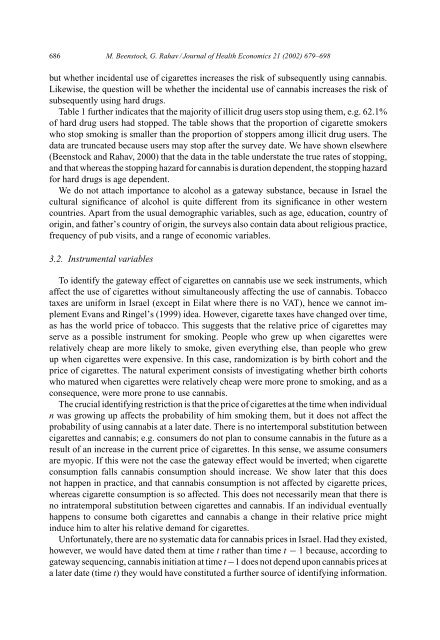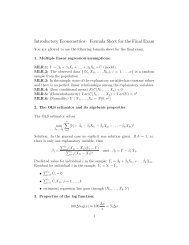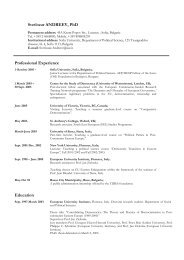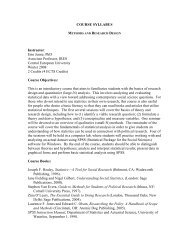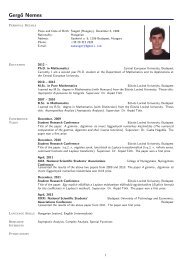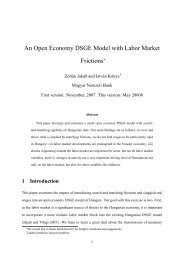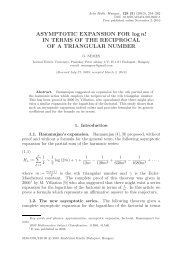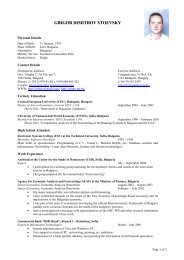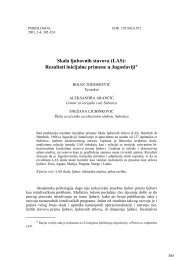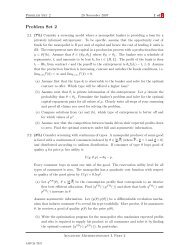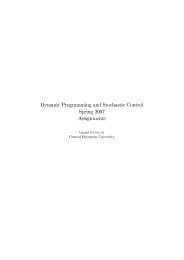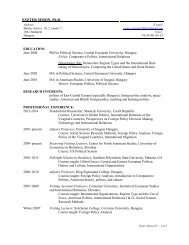Testing Gateway Theory: do cigarette prices affect illicit drug use?
Testing Gateway Theory: do cigarette prices affect illicit drug use?
Testing Gateway Theory: do cigarette prices affect illicit drug use?
Create successful ePaper yourself
Turn your PDF publications into a flip-book with our unique Google optimized e-Paper software.
686 M. Beenstock, G. Rahav / Journal of Health Economics 21 (2002) 679–698<br />
but whether incidental <strong>use</strong> of <strong>cigarette</strong>s increases the risk of subsequently using cannabis.<br />
Likewise, the question will be whether the incidental <strong>use</strong> of cannabis increases the risk of<br />
subsequently using hard <strong>drug</strong>s.<br />
Table 1 further indicates that the majority of <strong>illicit</strong> <strong>drug</strong> <strong>use</strong>rs stop using them, e.g. 62.1%<br />
of hard <strong>drug</strong> <strong>use</strong>rs had stopped. The table shows that the proportion of <strong>cigarette</strong> smokers<br />
who stop smoking is smaller than the proportion of stoppers among <strong>illicit</strong> <strong>drug</strong> <strong>use</strong>rs. The<br />
data are truncated beca<strong>use</strong> <strong>use</strong>rs may stop after the survey date. We have shown elsewhere<br />
(Beenstock and Rahav, 2000) that the data in the table understate the true rates of stopping,<br />
and that whereas the stopping hazard for cannabis is duration dependent, the stopping hazard<br />
for hard <strong>drug</strong>s is age dependent.<br />
We <strong>do</strong> not attach importance to alcohol as a gateway substance, beca<strong>use</strong> in Israel the<br />
cultural significance of alcohol is quite different from its significance in other western<br />
countries. Apart from the usual demographic variables, such as age, education, country of<br />
origin, and father’s country of origin, the surveys also contain data about religious practice,<br />
frequency of pub visits, and a range of economic variables.<br />
3.2. Instrumental variables<br />
To identify the gateway effect of <strong>cigarette</strong>s on cannabis <strong>use</strong> we seek instruments, which<br />
<strong>affect</strong> the <strong>use</strong> of <strong>cigarette</strong>s without simultaneously <strong>affect</strong>ing the <strong>use</strong> of cannabis. Tobacco<br />
taxes are uniform in Israel (except in Eilat where there is no VAT), hence we cannot implement<br />
Evans and Ringel’s (1999) idea. However, <strong>cigarette</strong> taxes have changed over time,<br />
as has the world price of tobacco. This suggests that the relative price of <strong>cigarette</strong>s may<br />
serve as a possible instrument for smoking. People who grew up when <strong>cigarette</strong>s were<br />
relatively cheap are more likely to smoke, given everything else, than people who grew<br />
up when <strong>cigarette</strong>s were expensive. In this case, ran<strong>do</strong>mization is by birth cohort and the<br />
price of <strong>cigarette</strong>s. The natural experiment consists of investigating whether birth cohorts<br />
who matured when <strong>cigarette</strong>s were relatively cheap were more prone to smoking, and as a<br />
consequence, were more prone to <strong>use</strong> cannabis.<br />
The crucial identifying restriction is that the price of <strong>cigarette</strong>s at the time when individual<br />
n was growing up <strong>affect</strong>s the probability of him smoking them, but it <strong>do</strong>es not <strong>affect</strong> the<br />
probability of using cannabis at a later date. There is no intertemporal substitution between<br />
<strong>cigarette</strong>s and cannabis; e.g. consumers <strong>do</strong> not plan to consume cannabis in the future as a<br />
result of an increase in the current price of <strong>cigarette</strong>s. In this sense, we assume consumers<br />
are myopic. If this were not the case the gateway effect would be inverted; when <strong>cigarette</strong><br />
consumption falls cannabis consumption should increase. We show later that this <strong>do</strong>es<br />
not happen in practice, and that cannabis consumption is not <strong>affect</strong>ed by <strong>cigarette</strong> <strong>prices</strong>,<br />
whereas <strong>cigarette</strong> consumption is so <strong>affect</strong>ed. This <strong>do</strong>es not necessarily mean that there is<br />
no intratemporal substitution between <strong>cigarette</strong>s and cannabis. If an individual eventually<br />
happens to consume both <strong>cigarette</strong>s and cannabis a change in their relative price might<br />
induce him to alter his relative demand for <strong>cigarette</strong>s.<br />
Unfortunately, there are no systematic data for cannabis <strong>prices</strong> in Israel. Had they existed,<br />
however, we would have dated them at time t rather than time t − 1 beca<strong>use</strong>, according to<br />
gateway sequencing, cannabis initiation at time t−1 <strong>do</strong>es not depend upon cannabis <strong>prices</strong> at<br />
a later date (time t) they would have constituted a further source of identifying information.


